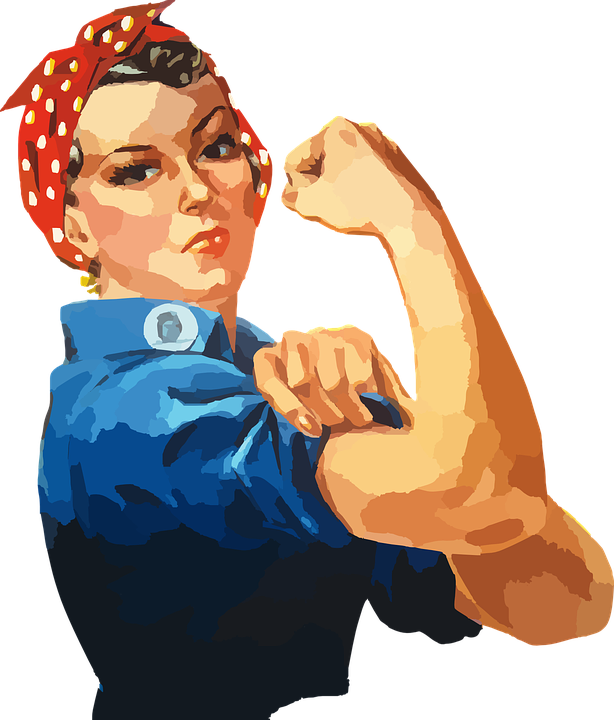The following is a chapter from Money, Sex, Power & Faith.
Order your copy in paperback or for Kindle!
“A gender-equal society would be one where the word ‘gender’ does not exist: where everyone can be themselves.” – Gloria Steinem
Throughout most of what we consider human history, women were seen as the inferior half of the species. Beyond a few notable women being handed the keys to the kingdom due to their lineage, the majority of women were not included in discussions of politics, religion, or commerce. Based largely on the religious texts that had been written by men and featured an absolutely male deity, the woman’s role was largely seen as a helpmate to man, who supposedly had been created in the image of God, and from whom women had been created as some sort of insignificant and largely irrelevant facsimile, aside from their ability to actually create life.
But in America, the fervor of freedom was spreading. As slaves had gained their freedom to become part of the new capitalist workforce, women became more and more disinclined to be subjugated to the role of the lesser citizen. American women followed the route of those in other nations, such as New Zealand, Australia, and Finland, in order to gain their right to vote. Still preceding many other industrialized nations, American women gained their right to participate in their democratic republic with the passing of the 19th Amendment in 1920, but the battle to get there had been a long one.
Many women had fought against the 14th Amendment granting citizenship to slaves (providing that they were men) in 1868 and the 15th Amendment which gave people of other races besides Caucasians the right to vote (also providing that they were men) in 1870. For although America had granted rights to a portion of the population that had heretofore hardly even been considered as fully human, women were still relegated to the role of inferior subjects.
Yet just as racism continued beyond the 15th Amendment, sexism continued beyond the 19th. And while women would continue to fight for equality, and went so far as to draft the Equal Rights Amendment in 1923 in order to prohibit discrimination based on gender, it was never ratified, and to this day, women still make significantly less than their masculine counterparts.
 Nevertheless, women went to work, proving their viability to capitalism by joining men in the factories, and when men went off to fight World War II, women stayed home and made bombs for them to fight with. However, that wasn’t the entire extent of women’s contribution. As it turned out, as capitalism continued to expand its opportunities to turn people’s labor into wealth, there were all sorts of things that women were good at which had previously been ascribed only to men.
Nevertheless, women went to work, proving their viability to capitalism by joining men in the factories, and when men went off to fight World War II, women stayed home and made bombs for them to fight with. However, that wasn’t the entire extent of women’s contribution. As it turned out, as capitalism continued to expand its opportunities to turn people’s labor into wealth, there were all sorts of things that women were good at which had previously been ascribed only to men.
As women found their place in the workforce, there began a movement which extolled their ability to be just as productive and significant as men. But although this rise of feminism sought to inculcate women’s abilities to be self-sufficient and on an even par with men, instead of shining a light on the feminine virtues, it largely served to proffer the masculinization of women. With capitalism’s reliance on mathematics as a means of harnessing and redistributing power, women were invited to be just as competitive and calculating as men, thereby diminishing what often makes women so wonderful in comparison to their masculine equivalents.
Although historically, women had been relegated to the less financially viable roles of raising children and establishing order in the household, their natural inclinations toward compassion and caring were not as highly valued in the competition for which capitalism called. Nevertheless, as the demands of capitalism grew, women joined the workforce to sell off their time in order to increase the wealth with which they could help their households to prosper. Unfortunately, with the myopic view that earning money was of primary importance in this new regime of economic viability, their roles as homemakers were indubitably disrupted.
Ironically, just as the notion of the “nuclear family” was being purported as the optimal living arrangement, with father, mother, and children serving as the core of civilization, women were starting to dissolve their roles as the nucleus of this system by dividing their time between home and work. While the “god-fearing” system of capitalism continued to pay lip service to the ideals of “family values”, it was simultaneously wrenching women, both by choice and by necessity, from their roles as the family’s core component to just another mechanism of monetized labor. While many may argue that the breakdown of the American family is largely due to an influx of immorality, it can be equally argued that it is due to simple lack of family presence caused by our infatuation with industrialism.
Yet that is not to say that industrialization didn’t have its positive effects on overcoming sexual inequality. “Industrialization, for all of its horrors and all of its nightmarish secondary effects,” wrote Ken Wilber in A Brief History of Everything, “was first and foremost a technological means to secure subsistence not from human muscle working on nature, but from machine power working on nature. As long as agrarian societies demanded physical human labor for subsistence (plowing), those societies inevitably and unavoidably placed a premium on male physical strength and mobility. No known agrarian society has anything even vaguely resembling women’s rights.”
“It is not that all of a sudden, women became smart and strong and determined after a million years of oppression, dupedom, and sheepdom,” Wilber continues. “It is that the social structures had evolved, for the first time in history, to a point that physical strength did not overwhelmingly determine power in culture. Biology was no longer destiny when it came to gender roles. Within a mere few centuries – a blink in evolutionary time – women had acted with lightning speed to secure legal rights to own property, to vote, and to ‘be their own persons,’ that is, to have a property in their own selves.”107
However, although all Americans had been freed from the tyranny of slavery, they were now enslaved by the time clock. And as their need for more creature comforts and the ability to claim more capital became more rapacious, men and women alike were drawn to the allure of industry and the monetary wealth that it promised. Yet since men had established the ability to create through the invention of the corporation, they had seemingly surpassed the woman’s ability to generate new life by creating something that would produce much more wealth than a mere human offspring. A corporation was a mechanism that would eventually have the rights of a human, and the ability to own property and create as well. As the allure of capitalism continued to grow, men and women alike would seize the power of this refurbished construct to move beyond mere labor and into the realms of competitive commerce.
Order your copy of Money, Sex, Power & Faith today!


